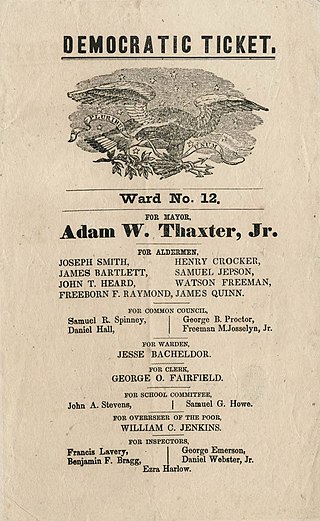| ||||||||||||||||
| ||||||||||||||||
| ||||||||||||||||
The 1843 Boston mayoral election saw the reelection of Whig Party incumbent Martin Brimmer. It was held on December 11, 1843. [1]
| ||||||||||||||||
| ||||||||||||||||
| ||||||||||||||||
| Elections in Massachusetts |
|---|
 |
The 1843 Boston mayoral election saw the reelection of Whig Party incumbent Martin Brimmer. It was held on December 11, 1843. [1]
Brimmer was the Whig Party nominee while Savage was the Democratic Party/locofoco nominee. The Whigs won a large victory in the coinciding municipal elections. [2]
| Party | Candidate | Votes | % | |
|---|---|---|---|---|
| Whig | Martin Brimmer (incumbent) | 4,874 | 66.82 | |
| Democratic | George Savage | 2,237 | 30.68 | |
| Scattering | Other | 183 | 2.51 | |
| Total votes | 7,294 | 100 | ||
The Boston mayoral election of 1854 saw the reelection of incumbent mayor Jerome V. C. Smith. It was held on December 11, 1854.
The Boston mayoral election of 1855 saw the election of Alexander H. Rice. It was held on December 10, 1855.
The Boston mayoral election of 1859 saw the reelection of Frederic W. Lincoln Jr. to a third consecutive term. It was held on December 12, 1859.
The Boston mayoral election of 1871 saw the reelection of incumbent Democrat William Gaston, who defeated Republican nominee Newton Talbot.
The Boston mayoral election of 1853–1854 saw the election of Citizens Union Party nominee Jerome V. C. Smith. The election took three votes, as no candidate secured the needed majority in the first two attempts. Incumbent Whig mayor Benjamin Seaver had run for reelection as his party's nominee in the first vote, but opted not to compete in the second or third votes.

The 1851 Boston mayoral election saw the election of Benjamin Seaver, a former president of the Boston Common Council, as mayor of Boston. The election took three votes, as no candidate secured the needed majority in the first two attempts. In the third attempt, Seaver won the required majority by the margin of a single vote. Incumbent Whig mayor John P. Bigelow was not a nominee for reelection.
The 1850 Boston mayoral election saw the reelection of incumbent Whig mayor John P. Bigelow to a third consecutive term. It was held on December 9, 1850.
The 1849 Boston mayoral election saw the reelection of incumbent Whig mayor John P. Bigelow. It was held on December 10, 1849.
The 1848 Boston mayoral election saw the election of Whig Party nominee John P. Bigelow. It was held on December 11, 1848. Incumbent Whig mayor Josiah Quincy Jr. was not a nominee for reelection.
The 1847 Boston mayoral election saw the reelection of Whig Party incumbent Josiah Quincy Jr. to a third consecutive term. It was held on December 13, 1847.
The 1846 Boston mayoral election saw the reelection of Whig Party incumbent Josiah Quincy Jr. It was held on December 14, 1846.
The December 1845 Boston mayoral election saw the election of Whig Party nominee Josiah Quincy Jr. It was held on December 8, 1845.
The 1844–45 Boston mayoral election saw the election of Native American Party nominee Thomas Aspinwall Davis as mayor of Boston. The election took eight votes, as no candidate secured the needed majority in the first seven attempts. Incumbent Whig Party mayor Martin Brimmer was not a nominee reelection.
The 1842 Boston mayoral election saw the election of Whig Party nominee Martin Brimmer. It was held on December 12, 1842. Whig Party incumbent Jonathan Chapman was not a nominee for reelection.
The 1841 Boston mayoral election saw the reelection of Whig Party incumbent Jonathan Chapman to a third consecutive term. It was held on December 13, 1841.
The 1840 Boston mayoral election saw the reelection of Whig Party incumbent Jonathan Chapman. It was held on December 14, 1840.
The 1839 Boston mayoral election saw the election of Whig Party nominee Jonathan Chapman. It was held on December 9, 1839. Whig Party incumbent Samuel Atkins Eliot was not a nominee for reelection.
The 1838 Boston mayoral election saw the reelection of Whig Party incumbent Samuel Atkins Eliot to a third consecutive term. It was held on December 10, 1838.
The 1836 Boston mayoral election saw the election of Whig Party nominee Samuel Atkins Eliot. It was held on December 12, 1836. Incumbent Samuel T. Armstrong was not a nominee for reelection.
The 1835 Boston mayoral election saw the election of Whig Party nominee Samuel Turell Armstrong. It was held on December 14, 1835.